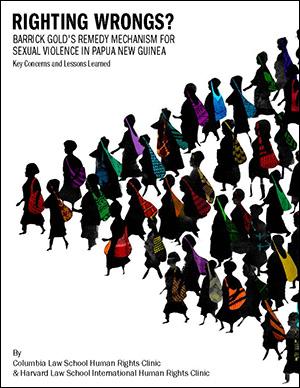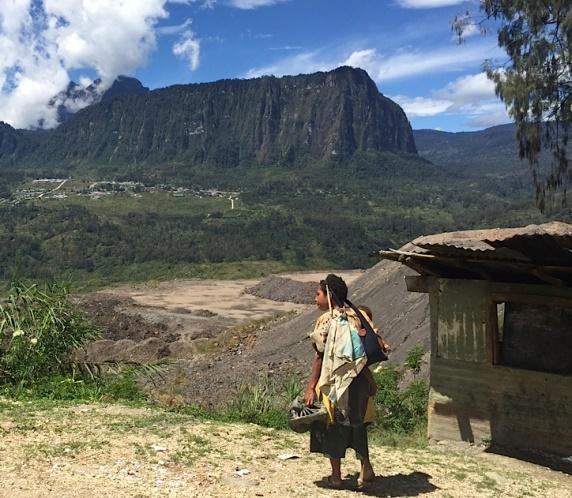"Righting Wrongs?"
New Report by Columbia Law School's Human Rights Clinic Finds Remedies for Rape in Papua New Guinea Deeply Flawed
Media contact: Sarah Knuckey 917-685-9098 | [email protected] (Geneva/NYC) or Columbia Law School Public Affairs, 212-854-2650 or [email protected]
Geneva & New York, November 19, 2015—A controversial process created by one of the world’s largest gold mining companies to compensate women for rapes and gang rapes in Papua New Guinea was deeply flawed, says a study released today by human rights clinics at Columbia and Harvard Law Schools. The clinics’ joint three-year study of Barrick Gold’s remedy mechanism at its Porgera gold mine found that the effort to provide remedy packages to 120 rape survivors was flawed from the start and fell far short of international standards.
“These are some of the most vicious assaults I have ever investigated,” said Columbia Law School Professor Sarah Knuckey, one of the lead authors of the report, and the director of the Law School’s Human Rights Clinic and Human Rights Institute. “The women and local communities had to struggle for years just to get the company to admit what happened.”
Most women were offered less than $6,000 USD each in compensation, and were also given some counseling and healthcare. Knuckey continued, “They had been suffering for far too long, and deserved much more.”
For several years, security guards at the Porgera mine physically assaulted and sexually abused members of the community. Faculty and students in the clinics have been investigating allegations since 2006, carrying out hundreds of interviews with local residents about conditions around the mine. In 2009 and 2010, the clinics testified before Canadian Parliament about the violations. It was only after repeated pressure by local and international groups that the Canadian mining company finally acknowledged the sexual violence and launched an internal investigation in 2010. The company created a remedy mechanism to handle claims by survivors two years later.
The clinics’ new 127-page report, Righting Wrongs?, finds that the women should not have had to sign away their legal rights to sue in order to receive remedies. In addition, the process excluded survivors of many other, non-sexual assaults by company guards, and had insufficient outreach, so some survivors did not know about the mechanism in time to bring their cases. The report also says that inadequate security measures were put in place for survivors, and that some women have reported being threatened and beaten up by family members when their rapes were discovered.
“If remedy mechanisms are to have any chance of addressing egregious violations, they must take on the gross power imbalance between a company and survivors,” said Clinical Professor Tyler Giannini, one of the lead authors and Clinical Director of the Human Rights Program at Harvard Law School. “Many of the women signed the company’s agreements because they felt that they simply had no other choice.”
The importance of power was highlighted again this year, when eleven women—who obtained U.S.-based lawyers from the non-governmental organization EarthRights International—refused to accept the company’s packages, and were given confidential settlement packages believed to be about ten times greater than the amount given to the roughly 120 women who used Barrick’s process. Upon learning this, the lesser-compensated survivors came together to demand more. The company quickly more than doubled their packages, which are still far less than what those who had U.S. lawyers received, and women in Porgera continue to demand that they should receive equitable packages.
“Since I joined the clinic this year, we have been regularly talking to many Porgeran women,” said Gulika Reddy, LLM ’16, a human rights lawyer from India, Columbia Law Human Rights Fellow, and student contributing author to the report. “It has been so inspiring to witness the courage and collective activism of the women who have organized themselves to demand better remedies. I hope that this report and the advocacy that follows contributes to their existing efforts and results in Barrick paying close attention to the legitimate demands of these women.”
The report found that there were some positive features of the mechanism, but that necessary safeguards such as consultation and prior engagement with the survivors and robust legal counsel for the women were either unimplemented or poorly implemented.
Rather than company-created models, the report suggests an approach that brings companies, survivors, and communities into the joint design of the remedy process. This approach centers the survivors in the process from the outset, and can help address power differentials. The report also calls on the company to provide additional remedies to the 120 women so that their agreements are in line with the amounts received by the eleven women represented by U.S. attorneys; void all legal waivers signed by women; provide remedy to individuals who faced other security guard abuses, including physical assaults; and to provide urgent security protection to women who are currently at risk.
“It is critical that businesses and the international community learn from the mistakes made in this case, and build on the positive steps that were taken here,” said Elizabeth O’Shea, LLM ’16, a human rights lawyer from Australia, Columbia Law Human Rights Fellow, and student contributing author to the report.
The remedy mechanism is one of the first to be created after the release of the United Nations Guiding Principles on Business and Human Rights in 2011, which set out the responsibilities of companies for human rights. The Porgera mine has been open since 1989. Barrick Gold became majority-owner and operator of the mine in 2006. Since then, the clinics have actively investigated the situation at the mine. The Columbia and Harvard human rights clinics presented the report this week in Geneva at the 4th Annual United Nations Forum on Business and Human Rights.
“We had an amazing response from other human rights advocates, investors, and businesses at the United Nations in Geneva, where we have been presenting the findings of our report. It is a wonderful opportunity to bring the concerns of Porgera to the international level,” said Whitney Hood, ’16, a Columbia Law student contributing author, who was recently awarded the Equal Justice Works Fellowship to work at Sanctuary for Families Anti-Trafficking Initiative in 2016-2018.
Knuckey said that the comprehensive study was the joint effort of over 20 students, fellows, and faculty from the law schools. “The students and faculty worked together to investigate violations, interview survivors, and carry out original legal and policy research,” she said. “It is only because of the extraordinary dedication and commitment to social justice of all these students that we were able to complete a study of this size and complexity.”
From Columbia Law School Human Rights Clinic: Benjamin Hoffman, Clinical Teaching Fellow and Lecturer in Law; Whitney Hood, ’16; Elizabeth O’Shea, LLM ’16; Stephanie Persson,’15; Gulika Reddy, LLM ’16; Holly Stubbs, ’15, were contributing authors and researchers. Candy Ofime, ’17; Keerthana Nimmala, ’16; and Ze-Emanuel Hailu, ’14, also provided assistance.
From Harvard Law School’s International Human Rights Clinic: Clinical Advocacy Fellow, Amelia Evans, LLM ’11, supervised a research trip that contributed to this report. In addition, numerous students, including Flora Amwayi, JD ’13; Skawenniio Barnes, JD ’14; Marie Cita, JD ’14; Krizna
Gomez, LLM ’13; Reeba Muthalaly, LLM ’14; Tamaryn Nelson, MPA ’14; Kiri Toki, LLM ’16; and Helen Zhang, JD ’16, contributed to the report.
New York University School of Law’s Global Justice Clinic also provided research in 2013-2014: Eleanor Jenkin, LLM’13; Mayuri Anupindi, LLM ’15; Will Henrich, JD ’14; and Tamara Morgenthau, LLM ’14, conducted research that contributed to the report.
# # #
The report is available at: www.rightingwrongsporgera.com
The Human Rights Clinic at Columbia Law School & The International Human Rights Clinic at Harvard Law School each work to advance human rights around the world. The clinics carry out human rights investigations, legal and policy analysis, litigation, report-writing, and international advocacy. The clinics bring together innovative education, social justice, and scholarly research, and students are trained to be strategic human rights lawyers.
The Human Rights Clinic at Columbia Law School: web.law.columbia.edu/clinics/human-rights-clinic.
The International Human Rights Clinic at Harvard Law School: hrp.law.harvard.edu.

